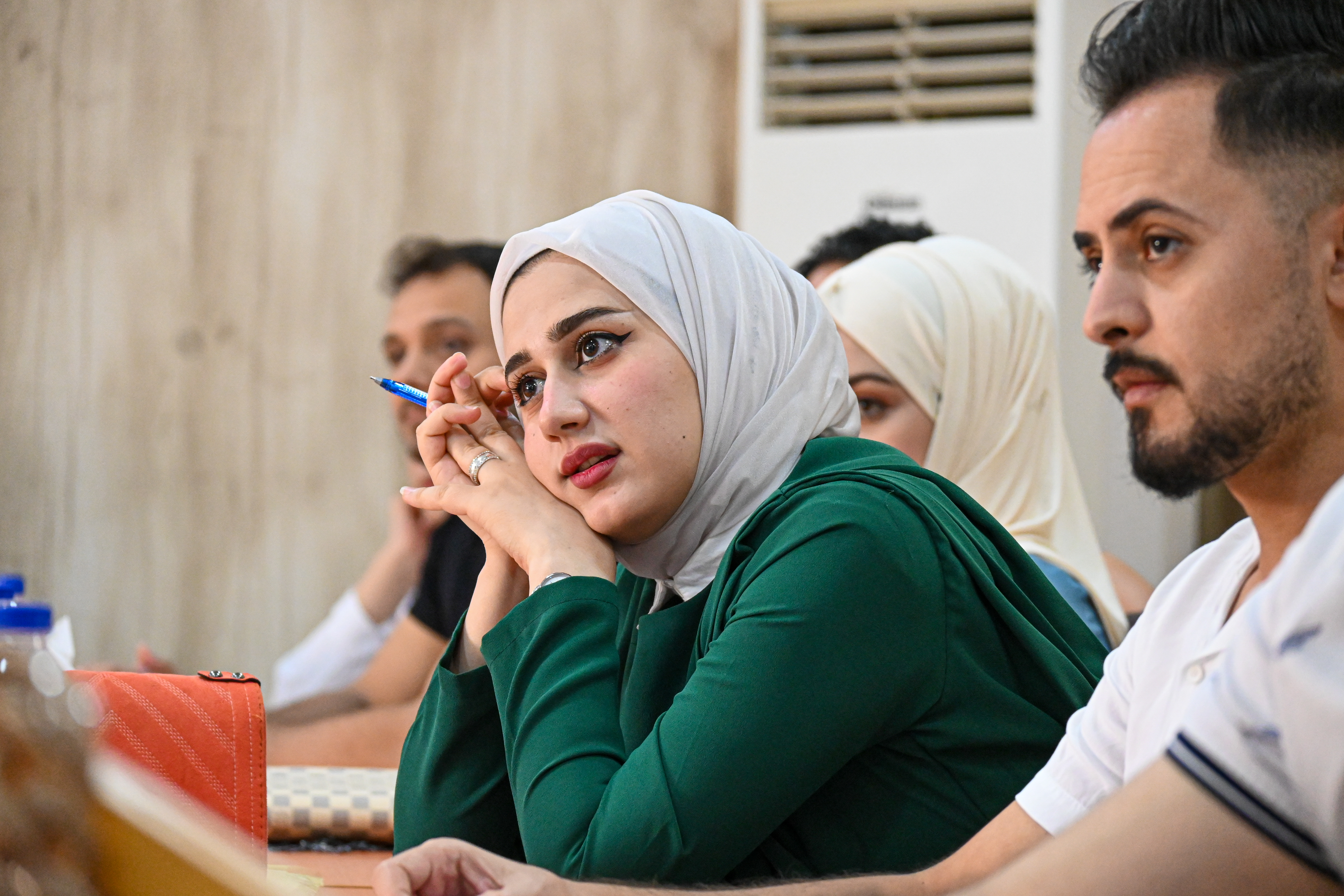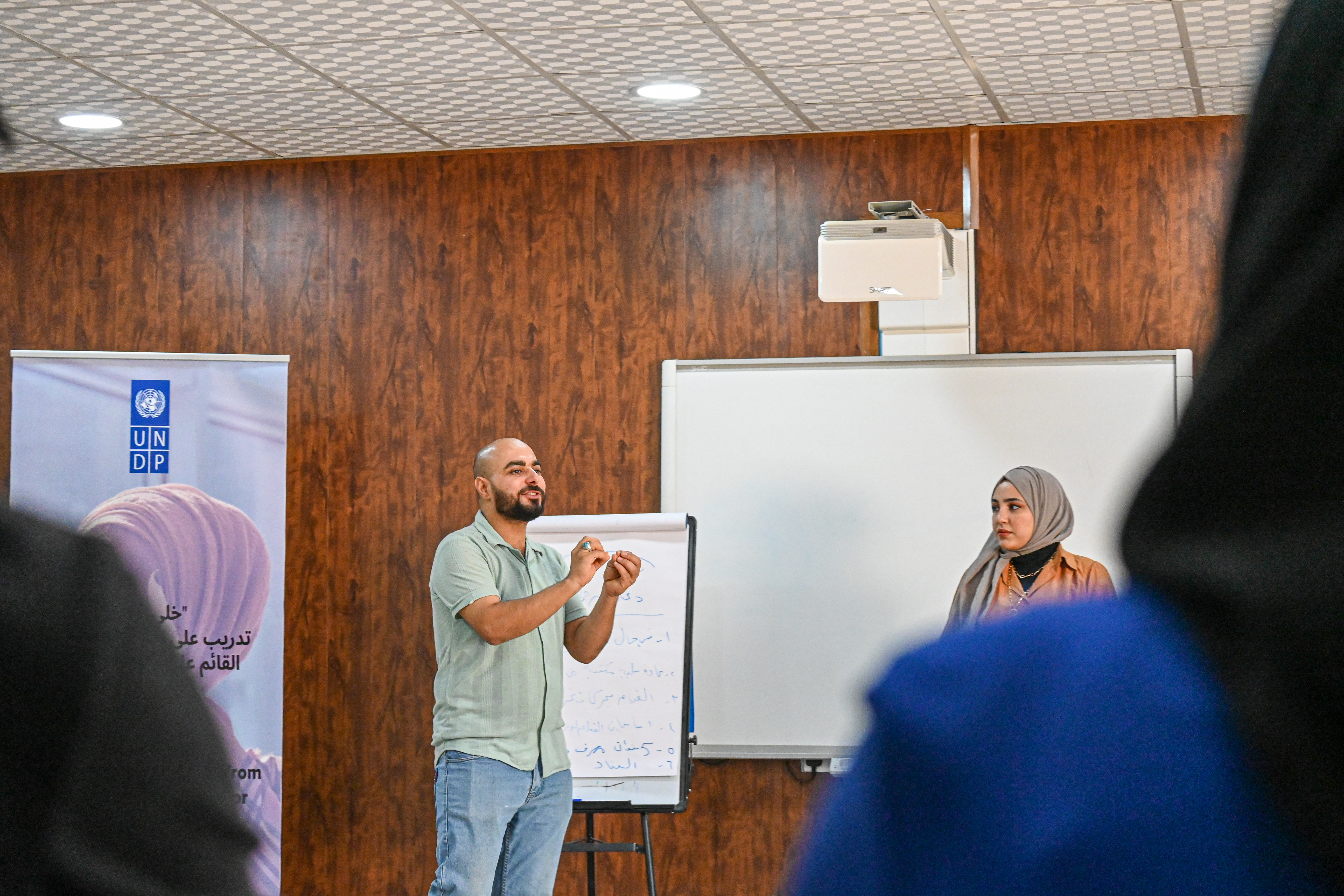How UNDP works with couples in Iraq to address gender-based violence and shift gender norms
Engaging couples, shifting gender norms
September 18, 2022

Couples at the recently concluded training in Ramadi
"We love each other. Most importantly, we respect each other and want to see each other grow and flourish. It's important to share respect, equality and power in a relationship," says Firas and Rawya. According to the newlywed couple from Ramadi, this is the key to a healthy, happy and most importantly, safe marriage.
Firas and Rawya got married two years ago. As soon as they first met, they felt a deep connection which blossomed into a strong friendship and, over time, developed into a trusting and healthy relationship. "It was only logical that we get married as there was no doubt that we were a good fit for each other. Most importantly, we also wanted the same things and had similar approaches to life," Firas says. "However, not all relationships are healthy and safe. Many people face different forms of emotional and physical violence in relationships and keep silent about it. It is especially worse when women are unaware of their rights," adds Rawya.

Firas and Rawya share a moment after the training. Photo: UNDP Iraq
UNDP works closely with couples like Firas and Rawya to reduce intimate partner violence and improve the well-being of survivors. This includes seventeen sessions for couples over three months, covering issues from creating safe spaces for open communication to addressing triggers of gender-based violence.
The project also includes a component for training community leaders on reducing gender-based violence to shift mindsets between couples and at the community level. Since 2021, 44 couples and 61 community leaders have been trained in Anbar and Diyala. Another ten couples from Diyala will receive this training by the end of this year.

Rawya during the training session in Ramadi. Photo: UNDP Iraq
"We learnt about creating safe spaces and listening to each other. We spent time talking about how to bring up children in a safe household. This is the only way we will be able to end the cycles of violence women and girls have faced over generations. After this training, we will ensure that we spread these messages to our friends, family and community," Rawya says.
Firas and Rawya welcome this initiative and are confident that such training sessions will help reduce violence in families.
On speaking to Muhanned and Aya, a young couple from Ramadi who also underwent the training with Firas and Rawya. "This training helped us understand how important it is to share all responsibilities at home. And most importantly, to find safe and healthy ways to communicate our issues," says the couple.

Muhanned and Aya during the training in Ramadi. Photo: UNDP Iraq
The curriculum for the training included a range of interactive and informal sessions, including take-home exercises designed to change mindsets and reduce intimate partner violence. It focused on addressing power imbalances, recognizing change as a process, understanding triggers of gender-based violence and building ways to manage triggers.
Lalith al-Khateeb, the main trainer for the sessions, is convinced that creating awareness is one of the most efficient solutions. "We conducted most of the sessions with the couples together. This forced the couples to have open and frank conversations with each other. The content of the training evolves progressively, from recognizing stages of change to taking concrete steps to make those behavioural changes," he says.

Lalith delivers a session for couples in Ramadi. Photo: UNDP Iraq
With adequate care and attention, such trainings can be implemented safely and effectively, even in contexts like Iraq, where violence is tolerated and common. As Lalith says, "I noticed that the women who attended training spoke with confidence and felt safe. It is important to handle this training with care, sensitivity and understanding of societal conditioning in Iraq."
The project is being implemented through UNDP's Funding Facility for Stabilization with support from Canada and Denmark. The couples were selected from a livelihoods skilling project they had participated in through the Facility. The curriculum is a part of 'Indashyikirwa', a programme led by UNDP globally that aims to reduce intimate partner violence and shift related attitudes, behaviours and social norms. It was initially implemented in Rwanda by CARE Rwanda, Rwanda Women's Network and Rwanda Men's Resource Center. UNDP Iraq adapted this model for returnees affected by the ISIL conflict.

 Locations
Locations



